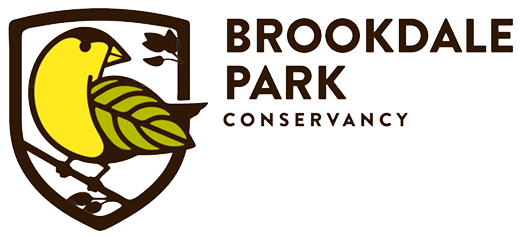Photo credit: Don McLoughlin
By Don McLoughlin
September was a great month in the Brookdale Park Rose Garden. After taking a little breather in August, the rose bushes gear up and put on a great display, second only to the peak bloom we see in early June. But as autumn officially arrives and September begins to wind down, it is time to start thinking about preparing your roses for the upcoming cold weather.
To be sure, roses will still be blooming for weeks to come. A few of the shrubs in the Brookdale Rose Garden will bloom even as late as almost Thanksgiving. But the idea is to encourage the plants to come in for a landing and prepare to go dormant for the winter. Roses have been around for millions of years and know what to do and when to do it. But as gardeners, here's how we can help.
A key word for rose care at this time of the year is....STOP. This is the time to stop pruning, stop deadheading (removing spent blooms), and stop fertilizing entirely. All of those activities encourage new growth, which you don't want this late in the season. Any new growth likely won't have time to toughen up ('harden', as they say) enough to survive the first of the frosts and freezes that could happen in the next several weeks. Encourage your plants to begin to go dormant.
Darlow's Enigma rose bush in the Brookdale Park Rose Garden now half asleep: partially still in bloom, partially done and setting rose hips (the orange "fruits" in the background).
Photo credit: Don McLoughlin
An exception to the 'very limited/no pruning' rule in Fall is that it is ALWAYS okay to prune away anything that is obviously dead, dying, or diseased. By the way, if you clip away a cane that you think is diseased, remember to clean your pruners (rubbing alcohol or something like that) before you move on to another plant, or you may unwittingly help to spread the disease.
Photo: Broken and dead canes in otherwise healthy plant - OK to take out any time!
Photo credit: Don McLoughlin
Another key word for winter prep is...CLEAN. As Fall progresses, it is a great idea to keep your rose beds clean - carefully raking out any leaves from rose bushes or trees, spent rose petals, pine needles, and whatever else collects around the base of your plants. All that organic debris gives a place for diseases, fungi, and harmful insects to overwinter and be right there waiting to cause trouble for your roses come Spring.
A final word could be... PROTECT. If your roses are particularly exposed to winter winds, you can create a burlap fence around them. Some folks will pile dry wood chips at the base of the plants (especially grafted ones) to help insulate the root base from the cold. But remember to remove that early in the Spring!
Once a few freezes have occurred, it's cold, and the plants are definitely dormant, you can do some tidying pruning to remove any long canes that might otherwise get damaged by whipping winds or just to reduce some plant size. However, in the Brookdale Park Rose Garden we have not needed to use burlap fencing or wood chips and we really save the heavy pruning for late February and early March as part of our early Spring prep.
So let your roses drift off to sleep this Fall - and be ready for them in the Spring!
Don McLoughlin is a certified Rutgers Master Gardener, a member of Master Gardeners of Essex County, Master Gardener project lead for the Brookdale Park Rose Garden, and Chair of the Brookdale Park Conservancy.




